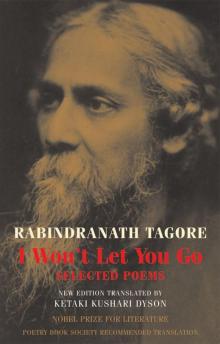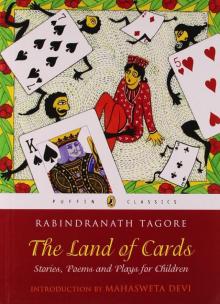- Home
- Rabindranath Tagore
Tagore Omnibus, Volume 1 Page 5
Tagore Omnibus, Volume 1 Read online
Page 5
Binodini’s answer was brief and snappy, ‘Shame!’
Asha said, ‘Why? I have heard from Mother that you are related to us.’
Solemnly, Binodini replied, ‘In this world, there are no fixed rules for telling who is a relative and who a stranger. Whoever you feel close to is your relative; and whoever perceives you as an intruder, may well be a relative, but is still a stranger.’
Asha felt this remark could not be countered. It was a fact that her husband had wronged Binodini; he had thought of her as an intruder and often felt quite irked by her presence.
That same evening Asha pleaded with Mahendra, ‘You must have a meeting with my Chokher Bali.’
Mahendra laughed. ‘That’s a grave risk you’re taking.’
Asha said, ‘Why, what’s there to fear?’
Mahendra said, ‘The kind of beauty you have described your friend to be, it’s no safe haven for a man to venture into.’
Asha said, ‘Oh, I can handle that. Please be serious—say you will meet her?’
It wasn’t as though Mahendra wasn’t curious to see Binodini; in fact, lately he’d even felt an urge to see her. But he felt this unwarranted impatience was somehow unethical. In matters of the heart, Mahendra’s beliefs on what was ethical and what wasn’t were a little more stringent than most people’s. In the past he had not heeded the idea of marriage for fear that after marriage his mother’s place wouldn’t stay the same. These days he wanted to hold his relationship with Asha so sacred that he wouldn’t let even the slightest curiosity about another woman tarry in his heart. He prided himself on the fact that his love was fastidious and pure. Similarly, he never wanted to acknowledge anyone else as his friend since that position was already given to Behari. If anyone ever felt attached to him and tried to further their acquaintance, Mahendra would go out of his way to be rude to them; he took pleasure in deriding them to Behari, and declaring himself absolutely indifferent to the average men around him. If Behari protested, Mahendra said, ‘You can do that Behari—wherever you go, you make plenty of friends. But I’m afraid I don’t feel like making friends with every Tom, Dick and Harry.’
Thus, when Mahendra’s heart lurched with inevitable eagerness and curiosity at the thought of meeting this unfamiliar woman, he felt he was letting down his own ideals. Eventually, he had lost his patience and gone to Rajlakshmi, requesting her to send Binodini away from their home.
He now said to Asha, ‘No, Chuni, I don’t have the time to meet your friend. I have my studies to attend to and you are there: where is the space for another friend?’
Asha said, ‘It’s all right, I won’t take up your study time; I’ll give my share of the time to Bali.’
Mahendra said, ‘You may well want to give it, but why would I let you do that?’
Mahendra claimed that Asha’s love for Binodini was eating into her love for her husband.With great pride he would say, ‘Your love is not as constant and steadfast as mine.’ This often caused the pair to squabble. Asha wouldn’t accept it—she’d cry and fight but never was she able to win the argument.
Mahendra grew to take pride in the fact that he was unwilling to let Binodini have even a hair’s space between the two of them. Asha hated this pride, but one day she bowed before it humbly and said, ‘All right then, will you please meet my Bali for my sake? Just once?’
Mahendra, after establishing the supremacy of his love over Asha’s, finally agreed to meet Binodini as a favour to his wife. But he made it clear, ‘That doesn’t mean she’ll be free to disturb me every now and then!’
The following morning Asha went into Binodini’s room and woke her up with a hug. Binodini said, ‘Wonder of wonders, the sunflower has left the sun and turned to the clouds today!’
Asha said, ‘I’m no good at all that poetic stuff, my dear, so don’t waste your breath. Why don’t you go and say all this to the one who’d appreciate it most?’
Binodini said, ‘And who is this poetic genius?’
Asha said, ‘Your brother-in-law, my husband! No really, I’m not joking—he’s very keen to meet you.’
Binodini said to herself, ‘Your wife has begged you to and so you’ve sent for me—if you think I’ll come running, you couldn’t be more wrong.’
Binodini refused doggedly. Asha lost face before her husband.
Mahendra was also very angry. How dare she refuse to come before him! Did she think he was like any other man? Others may have tried to find some excuse in all these days to talk to Binodini, to see her face. The fact that Mahendra never tried any such tricks should be enough for Binodini to realize that he was different. If she ever came to know him well, she’d surely see how extraordinary he was.
A couple of days ago Binodini had also felt quite upset. ‘I’ve been in this house for so long and Mahendra has never once tried to catch a glimpse of me. When I am in his mother’s room he never ever cooks up an excuse to come and speak to his mother. Why all the indifference? I am not a piece of furniture, I am a person, I’m a woman ! If he ever got to know me well, he’d know the difference between me and his cherished Chuni!’
Asha came to her husband with an idea. ‘I’ll go and fetch my Chokher Bali to our room saying you have gone to college. And then you’ll come in suddenly and confound her totally.’
Mahendra asked, ‘What has she done to merit such a harsh sentence?’
Asha said, ‘No, really, I am very angry indeed. She has refused to meet you! I’ll break her tenacity or my name is not Asha.’
Mahendra said, ‘I am not exactly dying to meet your bosom friend. I refuse to meet her like that, by stealth.’
Asha held his hand and begged, ‘Please do this for me, just this once? I want to shatter her pride somehow, on this one occasion; thereafter you two are free to do what you like.’
Mahendra did not reply. Asha pleaded, ‘Please dear, for my sake?’
Mahendra was actually getting more and more fired up—and so, with a great show of indifference, he conceded.
It was a sheer, silent autumn afternoon. Binodini was seated in Mahendra’s room, teaching Asha how to knit a woollen shoe. Asha was restive, looking at the door every now and then, dropping stitches frequently and revealing her own incompetence to Binodini.
Finally, Binodini lost her temper, snatched the knitting from her hands and said, ‘Oh, you are no good at this; I have work to do—I’m going.’
Asha said, ‘Sit for a little longer; let me try again—I won’t go wrong this time.’ She went back to the knitting diligently.
Meanwhile, Mahendra came up soundlessly and stood at the door behind Binodini; Asha smiled without looking up from her knitting.
Binodini asked, ‘Now what is making you smile?’
Asha couldn’t check her laughter; she burst into giggles and flung the knitting over Binodini’s head, saying, ‘You’re right my dear, this is not for me.’ She threw her arms around her friend and went on giggling.
Binodini had understood everything right at the start. Asha’s restlessness and gestures had revealed all. She was well aware that Mahendra had come and stood at the door. But she let herself fall into Asha’s transparent trap, like a simple, naïve fool.
Mahendra stepped into the room saying, ‘Pray share the joke with this hapless soul?’
Startled, Binodini tried to raise her anchal over her head. Asha caught her wrist.
Mahendra laughed. ‘Either you sit and I leave, or we both have a seat.’
Binodini didn’t go in for a great show of embarrassment, tugging her hands away from Asha’s grip and clamouring to leave, like most women would have. She spoke naturally and easily, ‘I shall sit because you’ve asked me to. But please don’t curse me and speak ill of me when I am gone.’
Mahendra said, ‘I’ll curse you so that you lose the power to move for a long time.’
Binodini said, ‘Oh, I am not afraid of that curse because your “long time” won’t be too long—it’s already over probably.’
She tr
ied to get up again and Asha pressed her, ‘Please, please do sit a little longer.’
14
ASHA ASKED, ‘TELL ME HONESTLY, WHAT DID YOU THINK OF MY CHOKHER bali?’
Mahendra said, ‘Not bad.’
Asha was a little hurt. ‘You never really like anyone.’
Mahendra said, ‘Except for one person.’
Asha said, ‘All right, I’ ll know if you’ve liked her or not once the two of you get to know each other a little better.’
Mahendra said, ‘Better than this! So this will happen frequently from now on?’
Asha said, ‘Even courtesy demands that you further your acquaintance with some people. If you stop meeting her after just one conversation, what would she think? You are so strange. Anyone else would have been dying to meet such a girl as often as possible—but for you it seems like a great burden.’
Mahendra was happy to have this difference with other people reiterated. He said, ‘All right, don’t get upset. I have nowhere to run away and your friend shows no signs of leaving—so we’ll certainly meet every now and then. And never fear, when we do, your husband has the social graces to be polite and cordial.’
Mahendra was under the impression that Binodini would find excuses and keep running into him from now on. He was wrong. Binodini never came anywhere near him and he never bumped into her accidentally, ever.
Mahendra couldn’t bring up the subject with Asha for fear of even a hint of eagerness showing through. His efforts at suppressing the occasional wish to meet and talk to Binodini only served to stoke his desire. And Binodini’s seeming indifference turned it into a blazing fire.
The day after he met Binodini, Mahendra asked Asha with carefully arranged airiness and laughter, ‘How did your Chokher Bali like this unworthy husband of yours?’
Mahendra had hoped he’d get a gurgling, detailed report from Asha on this subject without his having to ask. But when he waited for it and it didn’t come, he playfully brought up the question himself.
Asha felt very awkward. Binodini hadn’t said a word on the subject and Asha was quite miffed with her because of this. She said to her husband, ‘Be patient, let her get to know you better; how can she say anything on the basis of yesterday’s short conversation?’
Mahendra felt crestfallen at this response and it grew even more difficult for him to feign indifference towards Binodini. But before he could ask any more questions, Behari walked in and asked, ‘Mahin da, what are you two arguing about today?’
Mahendra said, ‘Just listen to this: your bouthan has gone and become a hair-band or fish-bone or something to a Kumudini or Promodini or someone; good for her, I suppose. But now if I too have to be cigar’s ash or match-stick to that lady, it’s really going too far!’
Behind her veil Asha showed signs of a storm gathering perilously. Behari glanced at Mahendra and laughed silently; then he said, ‘Bouthan, this is not a good sign. These are mere smokescreens. I have seen your Chokher Bali and I can swear that if I see her more often I wouldn’t call it my bad luck. But if Mahin da protests too much, I do see a cause for concern.’
This was fresh proof to Asha that Mahendra was very different from Behari.
All of a sudden Mahendra developed a desire for photography. Once long ago he had started learning photography and then given it up. Now he got his camera fixed, bought some film and began to take pictures of everything and everybody. He didn’t even spare the servants and bearers of the house.
Asha was very keen that he take a picture of her friend.
Mahendra said brusquely, ‘Fine.’
But Binodini’s answer was even more brusque. ‘No.’
Asha had to resort to another ruse and once again, it was obvious to Binodini from the very start. The plan was that Asha would somehow get Binodini to come up to her room in the afternoon and put her to sleep. Mahendra would take her picture as she slept and that would serve her adamant friend right indeed! The strange thing was that Binodini never took a nap in the afternoon. But that day when she came into Asha’s room, for some reason her eyes drooped at once. Draped in a red shawl and facing the window, she rested her head on her arm and fell asleep in such a lovely posture that Mahendra said, ‘She seems to have posed for a picture even in her sleep.’
Mahendra tiptoed around and fetched his camera. In order to decide on the best angle, he had to look at her from all sides. For art’s sake he even had to brush away a few strands of hair from her forehead—and when he didn’t like the effect, he had to correct it again. He whispered to Asha, ‘Just move the shawl a little to the left near her feet.’
The inept Asha whispered back, ‘I can’t do it, she’ll surely wake up. You do it.’
Mahendra did the needful.
Eventually, just when he had loaded the plate into the camera, Binodini seemed to sense the sound, sighed, turned her head and woke up with a start. Asha chortled in delight.
Binodini was extremely angry. Her sparkling eyes showered wrath upon Mahendra as she exclaimed, ‘This isn’t right!’
Mahendra said, ‘I agree with you. But how can I bear it if after all my stealth I’m not even able to bring home the loot? Pray let me finish my crime and then punish me as you please.’
Asha begged and pleaded with Binodini. The picture was taken. But this first picture was spoilt. So the photographer insisted on taking another one the following day. Finally, Binodini couldn’t say no to the proposal of taking one picture with both girls in it as a symbol of their everlasting friendship. But she said, ‘This will be the last one.’
So Mahendra deliberately spoilt that one. And then, over pictures and more pictures the acquaintance and camaraderie between them progressed in leaps and bounds.
15
DYING EMBERS GET A FRESH LEASE OF LIFE IF THE FIRE IS STOKED FROM without. The slight breach that had come about in the newly-weds’ romance soon healed itself and their passion burned afresh after the introduction of a third party in their midst. Asha lacked the capacity to laugh and make witty conversation. But Binodini could provide that in abundance; and so Asha found a safe haven behind Binodini’s strong persona. She no longer had to try so hard at keeping Mahendra entertained and amused all the time.
Within the short span of a few months, Asha and Mahendra had almost poured themselves out to each other—their song of love had started on the highest possible note—it was as if they were intent on eating up the principal instead of living off the interest. How were they to translate this deluge of recklessness into the mundane simplicity of daily life? How could Asha provide the fresh stimulation that Mahendra looked for every time tedium gripped him after traversing the heights of intoxication? It was then that Binodini brought in a colourful goblet filled with the fresh and the new—and Asha was relieved to see her husband in good humour again.
Now she no longer tried so hard herself. When Mahendra and Binodini laughed and joked, she simply laughed along joyfully. When Mahendra tried to cheat her at card games, she appealed to Binodini for justice. If Mahendra teased her or spoke out of turn, she expected Binodini to take her side and protest. In this fashion the threesome got accustomed to one another.
But this didn’t stop Binodini from tending to her household chores. She only joined in the fun after she had finished cooking, cleaning, supervising the servants and taken proper care of Rajlakshmi. Mahendra would get impatient. ‘You’ re going to spoil the servants by doing everything yourself.’ Binodini would answer, ‘That’s better than spoiling yourself by not doing a thing. Go on, you had better go to college.’
Mahendra would say, ‘It’s a nice cloudy day—’
Binodini would reply, ‘Oh no, you don’t get away with that—the carriage is ready—you must go to college.’
Mahendra would argue, ‘But I cancelled the carriage.’
Binodini would retort, ‘I called it back.’
She would bring his clothes for college and stand before him.
Mahendra would say, ‘You should have bee
n born in a Rajput household—you’d have had fun placing the armour on your loved one when he went to war.’
Binodini did not like the idea of dropping out of classes or skipping studies for fun. Under her strict regulation the practice of lounging about and having fun at any time of the day became a thing of the past in the household. And hence the evening sessions turned into an oasis of pleasure for Mahendra. His days yearned for themselves to end.
Earlier, when his meals weren’t ready on time, Mahendra gladly used this as a pretext to stay back home. These days Binodini took care to see that his meal was ready first thing in the morning and the minute he finished it, he was told that the carriage was waiting for him. Earlier, he seldom found his clothes neatly folded and laid out for him: on the contrary, they usually languished in a forgotten corner of some cupboard instead of going to the laundry and turned up many days later when one was searching for something quite different.
At first Binodini often chided Asha playfully in front of Mahendra, for these and other muddles. Mahendra too smiled indulgently at Asha’s helpless ineptitude. But soon, out of affection for her friend, Binodini relieved Asha of her duties. Everything in the household had a changed look since then. If a shirt button broke and Asha stood gazing at it helplessly, Binodini snatched the garment from her nerveless fingers and stitched it up in no time. One day a cat got to Mahendra’s plate of rice first and had a few mouthfuls. Asha was worried sick; Binodini went into the kitchen immediately, looked into various pots and pans and deftly rustled up another plate of food. Asha was dumbfounded at her proficiency.
Mahendra felt Binodini’s caring touch in his clothing and food, at work and leisure. The woollen shoes on his feet and the woollen scarf around his neck—made by Binodini—felt like a tangible emotional contact. These days Asha came to Mahendra, neat, tidy and all decked up by her friend: she felt like she was partly herself and partly someone else; she and Binodini seemed to have united like the Ganga and the Yamuna.
Behari was no longer as welcome as he was before—he was rarely sent for. Once Behari wrote to Mahendra to say that he’d like to come the next day at noon, a Sunday, and taste his mother’s cooking. Mahendra felt the Sunday would go waste. So he quickly wrote back that the next day he had some work and would have to go out. But Behari dropped by in any case to look them up after lunch. The bearer informed him that Mahendra had not left the house. Behari yelled out ‘Mahin da,’ as he bounded up the stairs and went straight into Mahendra’s room. Caught unawares, Mahendra said he had a headache and lay down facing the wall. Asha grew nervous when she saw the complexion of Mahendra’s mood. She glanced at Binodini hopefully. Binodini was well aware that it wasn’t a serious matter; but she said anxiously, ‘You’ve been sitting up for too long, why don’t you lie down. I’ll get some eau-de-cologne.’

 Selected Poems
Selected Poems The Lover of God
The Lover of God I Won't Let You Go: Selected Poems
I Won't Let You Go: Selected Poems The Land of Cards: Stories, Poems, and Plays for Children
The Land of Cards: Stories, Poems, and Plays for Children The Tagore Omnibus, Volume One
The Tagore Omnibus, Volume One The Boat-wreck
The Boat-wreck Chokher Bali
Chokher Bali Selected Short Stories
Selected Short Stories He (Shey)
He (Shey) Letters From a Young Poet 1887 1895
Letters From a Young Poet 1887 1895 Gora
Gora Tagore Omnibus, Volume 1
Tagore Omnibus, Volume 1 Selected Poems (Tagore, Rabindranath)
Selected Poems (Tagore, Rabindranath)